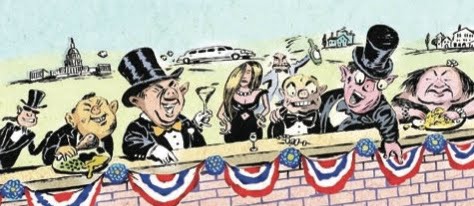Classic songs from years past are sometimes referred to as “golden oldies.” There are political fallacies that have been around for a long time as well. These might be called brass oldies. It certainly takes a lot of brass to keep repeating fallacies that were refuted long ago
How Capitalism Will Save Us-Steve Forbes & Elizabeth Ames
Capitalism is the world’s greatest economic success story. It is the most effective way to provide for the needs of people and foster the democratic and moral values of a free society. Yet the worst recession in decades has widely–and understandably–shaken people’s faith in our system. Even before the current crisis, capitalism received a “bad rap” from a culture ambivalent about free markets and wealth creation. This crisis of confidence is preventing a full recognition of how we got into the mess we are in today–and why capitalism continues to be the best route to prosperity.
Lifestyles of the Rich and Liberal
“The very rich are different from you and me,” F. Scott Fitzgerald observed, eliciting the famous rejoinder from Ernest Hemingway, “Yes, they have more money.” Today he might add that they are apt to be Democrats, often exceedingly liberal Democrats, fond of talking of “fairness” and equity as they rake in what seems like vast sums of money, and spend immense sums on themselves. Confronted with tales of their zillionaire populists, liberals claim (a) that the way that they vote counts for more than the way they spend money; and (b) that many great names in political history have lived well and had money themselves. The last point is true, but there is a difference in degree and in kind that has only come recently. Let us consider the facts.
I, Pencil
I am a lead pencil—the ordinary wooden pencil familiar to all boys and girls and adults who can read and write. Writing is both my vocation and my avocation; that’s all I do.
The Divine Right of Government
History is a great teacher. It often provides clues that enable us to understand the present and future.
Ancient regimes’ concept of divine right of kings seems pertinent to today. Wikipedia offers as good a summary as any:
The Divine Right of Kings is a political and religious doctrine of royal absolutism. It asserts that a monarch is subject to no earthly authority, deriving his right to rule directly from the will of God. The king is thus not subject to the will of his people, the aristocracy, or any other estate of the realm, including the church.
Ayn Rand
Ayn Rand was born in St. Petersburg, Russia, on February 2, 1905. At age six she taught herself to read and two years later discovered her first fictional hero in a French magazine for children, thus capturing the heroic vision which sustained her throughout her life. At the age of nine, she decided to make fiction writing her career. Thoroughly opposed to the mysticism and collectivism of Russian culture, she thought of herself as a European writer, especially after encountering Victor Hugo, the writer she most admired.
Why “Atlas Shrugged” is flying off the bookshelves
According to a Library of Congress survey, Atlas Shrugged, published in 1957, may be second to the Bible as the most influential book read in America. It is required reading in management training at BB&T, the 12th-largest bank in the U.S. and one that resisted taking TARP bailout funds. Since the Obama administration took office, Atlas Shrugged has been making a renaissance with rising sales and library waiting lists, partly because it explains our current economic woes more straightforwardly than most of what we hear from today’s experts.
Ryan responds to scurrilous Krugman attack on “Roadmap to America’s Future”
Wisconsin Rep. Paul Ryan is unique among House Republicans in having assembled a comprehensive federal spending, taxation and entitlement reform blueprint, which he calls a “Roadmap to America’s Future.”
America’s Ruling Class — And the Perils of Revolution
As over-leveraged investment houses began to fail in September 2008, the leaders of the Republican and Democratic parties, of major corporations, and opinion leaders stretching from the National Review magazine (and the Wall Street Journal) on the right to the Nation magazine on the left, agreed that spending some $700 billion to buy the investors’ “toxic assets” was the only alternative to the U.S. economy’s “systemic collapse.” In this, President George W. Bush and his would-be Republican successor John McCain agreed with the Democratic candidate, Barack Obama.





